Suchergebnisse
Berichte aus Energie- und Umweltforschung 5/1997 Photovoltaic in Buildings

Ergebnisse von Task XVI im Rahmen des IEA-Forschungsprogramms "Solar heating & cooling"
IEA Bioenergy Task 33: Newsletter Vol. 1/2015
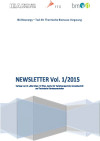
Dr. Jitka Hrbek
Herausgeber: BMVIT
Deutsch, 6 Seiten
Downloads zur Publikation
1000 Passivhäuser in Österreich
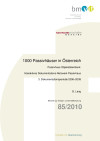
Passivhaus Objektdatenbank: Interaktives Dokumentations-Netzwerk Passivhaus 3. Dokumentationsperiode 2006-2009
Schriftenreihe
85/2010
G. Lang
Herausgeber: BMVIT
Deutsch, 210 Seiten
Downloads zur Publikation
IEA - 4E "Bright Spark" Newsletter - December 2015

Herausgeber: IEA - 4E Bright Sparks
Englisch, 5 Seiten
win wi[e]n: blockentwicklung erdgeschosszone
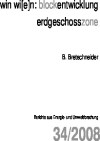
Schriftenreihe
34/2008
B. Bretschneider
Herausgeber: BMVIT
Deutsch, 176 Seiten
Downloads zur Publikation
Aerosols from biomass combustion (2005)

Proceedings of a workshop organised at the 18th of March 2005 in Graz. A summary of the meeting is available for download. The full proceedings are published as a separate book. IEA Implementing Agreement "Bioenergy".
Englisch
S-House

3/2005
Herausgeber: BMVIT
Deutsch, 6 Seiten
Downloads zur Publikation
Berichte aus Energie- und Umweltforschung 18/1997 Entwicklung des ökologischen Faserwerkstoffs "ZELFO 2"

Ein alternativer Werkstoff
Filmische Dokumentation in 3sat "Die Zukunft des Wohnens"

Produktion einer 45min Dokumentation über die Zukunft des Wohnens
Life extension of coal-fired power plants (Ambrosini, 12-2005)

Englisch
IEA Bioenergy Task 33: Newsletter Vol. 3/2014
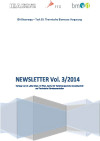
Thermische Biomassevergasung
Herausgeber: BMVIT
Deutsch, 5 Seiten
Downloads zur Publikation
Science documentary "Building of Tomorrow" for television

The documentary film for ORF/ 3sat and Bayern alpha-TV presents the concept of the passive house. Fascinating pioneer projects of the Austrian Program on Technologies for Sustainable Development, Sub-Program "Building of Tomorrow", have been filmed over several months. The importance of taking care of ecology and sustainability when constructing houses is demonstrated to a large audience.
IEA Bioenergy Task 33: Newsletter Vol. 2/2015
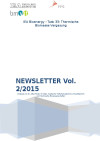
Thermische Biomassevergasung
Herausgeber: BMVIT
Deutsch, 7 Seiten
Downloads zur Publikation
Technologie Portrait Thermische Solarenergie (Juni 2000)

Das Technologie Portrait bietet einem Fachpublikum ebenso wie der interessierten Öffentlichkeit ein kompaktes Querschnittsbild des Technologiebereiches Thermische Solarenergie.
15. Internationale Passivhaustagung
27. - 28. Mai 2011
Congress Innsbruck
Innsbruck, AT
Rund 1.200 Passivhausinteressierte aus über 50 Nationen nahmen vom 27. bis 28. Mai 2011 am weltweit größten Kongress zum Thema energieeffizientes Bauen im Congress Innsbruck teil.
Unterstützungsmaßnahmen zur Technologieinternationalisierung
6. September 2016
Oesterreichische Kontrollbank, Reitersaal
Vorstellung der Förderungsprogramme kit4market und tec4market
Nationaler Workshop Biotreibstoffe
29. September 2016
Bundesministerium für Verkehr, Innovation und Technologie, Radetzkystraße 2, 1030 Wien
Es werden aktuelle Forschungsergebnisse und der Status der Markteinführung von Biotreibstoffen präsentiert. Der Workshop findet im Rahmen der IEA Forschungskooperation statt.
Smart Communities and Technologies
17. Oktober 2016, 13:30 – 18:30 Uhr
TU Wien, 1040 Wien, Karlsplatz 13 (Hauptgebäude)
Im Rahmen der Veranstaltung „Blickpunkt Forschung“ präsentieren TUW-ForscherInnen und ihre Unternehmenspartner anwendungsnahe Projekte zu den zukunftweisenden Themen in zwei Parallelsesssions.
Highlights der Bioenergieforschung 2017
20. Jänner 2017
Graz
Aktuelle Entwicklungen und Ergebnisse aus den Bioenergie-Tasks wurden vorgestellt. Transnationale Forschungs- und Entwicklungsprojekte zur nachhaltigen Nutzung von Bioenergie aus dem ERA-NET Bioenergy stellten einen weiteren wichtigen Schwerpunkt dar.
Workshop: Sustainable Photovoltaics
19. März 2018
Wirtschaftskammer Österreich, Wiedner Hauptstraße 63, 1045 Wien, AT
Ziel dieses Workshops ist die Vernetzung von nationalen und internationalen ExpertInnen im Bereich der Nachhaltigkeit sowie Umweltbewertungen und Recyclingfragen für Photovoltaik und bauwerkintegrierter Photovoltaik.
